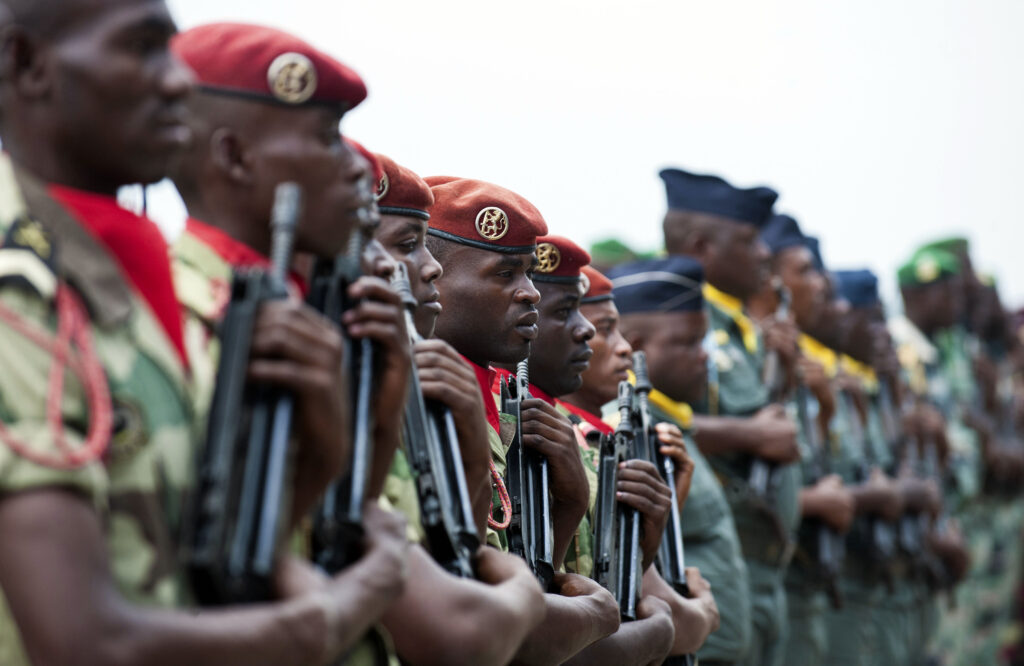Gabon’s Coup and Africa’s Butterfly Effect: A Wake-Up Call for Europe
by Dr Joana de Deus Pereira, Senior Research Fellow, RUSI Europe
In the vast expanse of Africa, the whisperings
of a butterfly’s wings can summon a storm. Gabon, a small country on the
equator, is the latest to feel this storm’s rage as a coup d’état threatens to
unsettle its political landscape. The recent ousting of its government is not
an isolated event but a powerful echo of Françafrique’s intricate
history and its lingering influence. Originally conceived in 1945 as an African
version of the British Commonwealth, the term Françafrique – which sought to depict the unique
postcolonial relationship between France and its former African territories – soon
became a symbol of France’s continued involvement in Africa’s politics and
economy. How is the French legacy viewed today, and what role does it play in
the recent wave of coups?
Gabon: A Lens on Broader Dynamics
Gabon’s political tumult is reflective of a
broader pattern. Recent data highlights an unsettling trend: a resurgence of coups after decades of relative decline. When,
following coups in Mali and Guinea, Sudan experienced a coup in 2021, UN
Secretary-General António Guterres didn’t mince words, describing the trend as
an ‘epidemic’.
From the colonial era to its independence in
1960, Gabon’s journey has been intertwined with France. Even after gaining
sovereignty, French involvement persisted, particularly in the country’s
prosperous oil sector. While these ties have contributed to economic growth,
they have also fuelled simmering discontent. For many Gabonese, especially the
youth, France’s lingering footprint is viewed with suspicion, seen as
neo-colonialism rather than genuine partnership. This sentiment extends to
several aspects of Gabonese society. The CFA Franc, a currency underpinned by
the French Treasury, is often criticised as a mechanism of French control. Similarly, public aid from France,
while ostensibly supportive, is perceived by some as a way to maintain
influence and as favouring the Gabonese elite over the masses.
Adding another layer to this narrative is the
growing influence of Russia in certain African regions. Russian groups like
Wagner have been active in shaping perceptions, amplifying anti-French rhetoric while championing pro-Russian sentiments. This geopolitical dance has
apparently been influenced by external entities, and it is redefining alliances and
rivalries across the continent.
Modern Pan-Africanism: From French to Russian Influence?
In the digital age, neo-Pan-Africanist narratives have found fertile ground on social
media, where they can gain significant traction. These narratives, however,
have sometimes transitioned from constructive critique to aggressive invective
against policies, often specifically targeting French influence in Africa.
Pan-Africanism, an intellectual and political
movement, has for decades championed African independence and solidarity among
African people and Afro-descendants. From its roots, it has evolved into what
is widely termed neo-Pan-Africanism. This evolution, fuelled by the desire for
true African autonomy, also manifests in various sentiments, some of which have
been intensified and can veer into the realms of conspiracy, populism and even
xenophobia.
Among the most vocal neo-Pan-Africanist activists and
influencers
are Kemi Seba and Nathalie Yamb. From his early engagements with the French
branch of the ‘Nation of Islam’ to his establishment of Urgences
Panafricanistes in 2015, the Franco-Beninese Kemi Seba’s journey has been
characterised by a robust commitment to Pan-Africanism. Seba has participated
in a Pan-Africanist tour across Europe with tickets available on Eventbrite, mobilising thousands of
participants in the biggest capitals of Europe.
Nathalie Yamb, widely known as ‘The Lady of
Sochi’ or ‘Nathalie Yambonov’, champions the cause of eliminating French
influence from Africa. With Swiss-Cameroonian roots, her rhetoric primarily
opposes French influence, and she is particularly vocal against West African
presidents who are perceived as pro-French. Yamb’s influence grew significantly
after her participation in the inaugural Russia–Africa conference in Sochi in
2019. Her regular social media updates delineate her fierce Pan-Africanist
stance. She was present at the recent 2023 BRICS Summit, and her tweets are
widely shared across social media platforms.
One of the intriguing facets of the neo-Pan-Africanism
movement is its relationship with foreign entities. The alignment between neo-Pan-Africanist
circles and Vladimir Putin’s regime is evident. There are clear indications that
certain individuals and entities, in their push against French influence, are
aligning with Russian interests, with figures like Kemi Seba having connections
with prominent Russian personalities.
Beyond Africa: A Global Reckoning
The political waves originating from Africa
have far-reaching implications. Europe, in particular, cannot afford to view
these events as distant or isolated. The intertwined fates of continents mean
that economic upheavals, mass migrations or extremist ideologies birthed in one
region can cascade across borders.
Europe’s historical and contemporary ties with
Africa further underscore the importance of attentive diplomacy. Africa’s
political upheavals should serve as a clarion call for the international
community. The evolving narratives across Africa, from the rainforests of Gabon
to the deserts of Mali, encapsulate a myriad of emotions, histories and
aspirations.
The message here is unambiguous: it is a dire
wake-up call. If we continue to disregard the signs, the reverberations of
Africa’s political storms might reach Europe’s shores sooner than expected.
In geopolitics and international relations, no
event – no matter how remote – is isolated. It is high time to cast a vigilant
eye over Africa’s political landscape, or Europe may find itself unprepared for
the storm that follows.
The views expressed in this Commentary are the author’s, and do not represent those of RUSI Europe or any other institution.

More about the author:
Dr Joana de Deus Pereira, Senior Research Fellow, RUSI Europe
